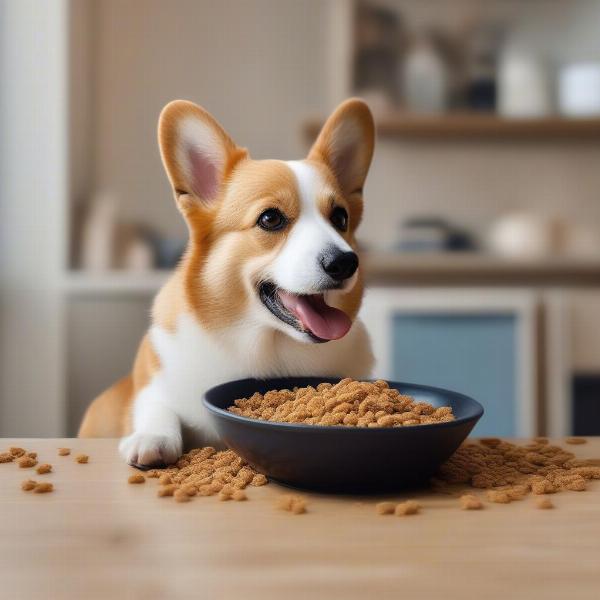Corgis, with their adorable short legs and fluffy butts, have captured the hearts of dog lovers worldwide. But finding the best dog food for corgis requires careful consideration of their unique needs. This guide explores the nutritional requirements of these charming herding dogs and provides recommendations to help you choose the optimal diet for a healthy, happy corgi.
What constitutes the best dog food for Corgis? Their playful energy and propensity for weight gain necessitates a balanced diet that supports their active lifestyle while preventing obesity. We’ll delve into specific ingredients, portion control, and feeding schedules tailored for Corgis of all ages and activity levels. Whether you have a playful puppy or a senior settling into a slower pace, understanding their dietary requirements is crucial for their overall well-being.
Understanding Corgi Nutritional Needs
Corgis, like all dogs, require a balanced diet rich in protein, healthy fats, carbohydrates, vitamins, and minerals. However, their short stature and active nature mean they have specific needs. Protein is essential for muscle development and repair, crucial for these energetic dogs. Healthy fats contribute to a glossy coat, healthy skin, and provide sustained energy. Carbohydrates offer a readily available energy source. Finally, vitamins and minerals support overall health and bodily functions.
What should you avoid in Corgi food? Artificial colors, flavors, and preservatives offer no nutritional value and can even be harmful. Similarly, fillers like corn and soy can contribute to weight gain without providing essential nutrients.
 Best Dog Food for Corgis: Understanding Nutritional Needs
Best Dog Food for Corgis: Understanding Nutritional Needs
Best Dog Food Types for Corgis
Several types of dog food cater to different Corgi needs and preferences. Kibble is a popular choice due to its convenience and affordability. Wet food offers higher moisture content, beneficial for Corgis prone to urinary tract issues. Raw and homemade diets are gaining popularity, allowing for complete control over ingredients. However, these require careful balancing to ensure they meet all nutritional needs.
Choosing the Right Food for Your Corgi’s Life Stage
A Corgi’s dietary requirements change throughout its life. Puppies need food formulated for growth, with higher calorie and protein content. Adult Corgis benefit from a maintenance diet that supports their activity level and helps maintain a healthy weight. Senior Corgis often require food with lower calories and added joint support.
small short legged dog crossword clue
What are the specific dietary considerations for a senior Corgi? As Corgis age, their metabolism slows down, and they become less active. Therefore, senior Corgi food should have lower calories to prevent weight gain. Additionally, ingredients that support joint health, such as glucosamine and chondroitin, are crucial for maintaining mobility.
Addressing Common Corgi Health Concerns through Diet
Certain health issues common in Corgis can be managed through diet. Obesity is a significant concern due to their short legs and long backs. Feeding a weight management formula and carefully controlling portions can help prevent or address obesity. Hip dysplasia, another common issue, can benefit from food containing ingredients that support joint health.
What is the connection between diet and hip dysplasia in Corgis? Hip dysplasia is a genetic condition that can be exacerbated by obesity. Feeding a diet that promotes a healthy weight and contains joint-supporting ingredients can help manage the symptoms and improve your Corgi’s quality of life.
“A balanced diet is the foundation of a healthy Corgi,” says Dr. Emily Carter, DVM, a veterinary specialist in canine nutrition. “By understanding their specific needs, you can make informed decisions about their food, contributing to their overall well-being.”
Conclusion
Choosing the best dog food for your Corgi requires careful consideration of their individual needs, age, activity level, and any existing health concerns. By prioritizing a balanced diet rich in high-quality ingredients and avoiding unnecessary fillers and additives, you can provide your Corgi with the nutrition they need to thrive. Remember to consult with your veterinarian for personalized recommendations based on your Corgi’s specific circumstances.
FAQ
-
What is the ideal feeding schedule for a Corgi puppy? Corgi puppies should be fed small, frequent meals throughout the day, typically three to four times.
-
How much food should I give my adult Corgi? The recommended amount varies based on factors like age, activity level, and the specific food. Refer to the feeding guidelines on your chosen dog food packaging and consult your veterinarian.
-
What are some signs of food allergies in Corgis? Common signs include itching, skin irritation, digestive upset, and ear infections.
-
Is it okay to give my Corgi treats? Treats can be given in moderation, ensuring they don’t exceed 10% of their daily caloric intake.
-
Can I switch my Corgi’s food suddenly? Sudden food changes can cause digestive upset. Gradually introduce new food over several days, mixing it with their current food.
-
What should I do if my Corgi is overweight? Consult your veterinarian to develop a weight management plan that includes dietary adjustments and increased exercise.
-
Are grain-free diets good for Corgis? While some Corgis thrive on grain-free diets, they are not necessary for all. Consult your veterinarian before switching to a grain-free diet.
dog support back legs
10kg dog
corgi dogs for sale in iowa
ILM Dog is your trusted resource for comprehensive information on dog breeds, health, training, nutrition, and more. We provide expert advice and practical tips to help you provide the best possible care for your canine companion. Whether you are a seasoned dog owner or just starting your journey, ILM Dog offers valuable insights and resources to enhance your dog’s life. Contact us today for personalized guidance at [email protected] or +44 20-3965-8624. Visit us at ILM Dog for more information on dog care and everything Corgi related.